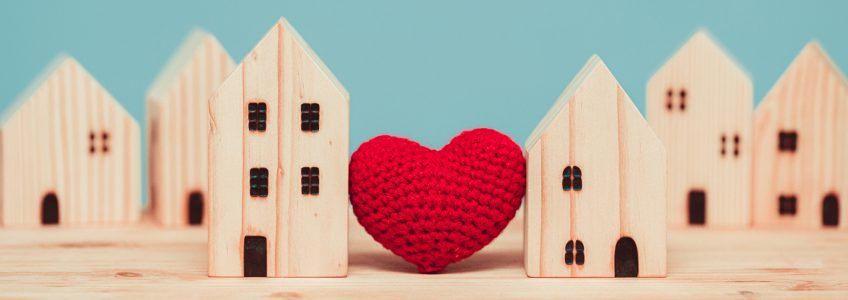How to Be a Good Neighbor in Your Apartment Community
How to be a good neighbor in your apartment community
Undoubtedly, one of the most important factors to consider when looking for a great rental experience is the physical home itself. But did you know that your neighbors are just as influential and as important to your living experience? If you don’t coexist well with your neighbors, expect to experience an uncomfortable time.
With that said, here are 5 ways to become the best neighbor possible:
Communicate
Introduce yourself as soon as you move in, and keep saying “hello” every time you bump into your new neighbor. Also, ensure to communicate important things such as problems with the buildings, periods you’ll be away, and any other worthy information.
This way, those around you will realize that you’re a nice, trustworthy person and you’ll soon make friends around your living space.
Keep your surroundings clean and neat
Everyone hates living next to a slob. So make every effort to spruce up both the outside and inside of your apartment. This may mean clearing away clutter like garbage, shoes, and leaves. If you don’t maintain a clean surrounding, you’re likely to attract pest and rodent problems that will eventually affect your neighbors.
Be respectful
It’s important to respect other people’s space and time, especially when you’re residing in a shared space such as a complex apartment. This means that you avoid entertaining loud parties or playing loud music late into the night.
Being respectful also means being mindful of shared walls, as well as not using your shared/outdoor spaces for anything unpleasant or dangerous.
Adhere to all apartment community rules
Your apartment’s management most likely has several guidelines all residents ought to follow. Those rules usually cover everything from where to dispose of garbage, where to pack your car, and even how to solve disputes. Follow them! They’re in place in order to develop the community into a happier, cleaner, and friendlier place.
Train your pets
According to a recent National Pet Owners Survey, about 85 million families or 77% of all US households have a pet. If you fall into this category, ensure to train your pets so they don’t end up a nuisance to your neighbors. In other words, your cats or dogs shouldn’t be noisy and should know how to relieve themselves in designated spots only.
Be a thoughtful neighbor
The key to becoming a good neighbor is treating those around you just as you would like them to treat you. Show them respect and be as amicable as you can. This way, you’ll get along and enjoy better relationships with everyone.
9 Secrets to Getting Your Deposit Back
9 secrets to getting your security deposit back
Many have been there before. You’ve notified the landlord that you’re moving out, cleared the last month’s rent and any other pending bills and everything seems set for relocating except for one thing – the security deposit.
You know that getting your hands on that hefty chunk of change, and on time, would significantly ease your burden. So how do you convince the landlord to release the security deposit on your lease when they’re withholding it or taking too long? Here are several quick pointers.
- Review your lease agreement before moving out (and moving in!)
The lease agreement includes crucial information about security deposit policies. It should tell you when and how to notify the landlord that you’re moving out. It should also detail the terms and conditions for receiving your security deposit back including the moving out inspection requirements as well as the landlord’s time limit for releasing the money. - Know your landlord
Knowing your landlords’ reputation before negotiating with them will give you a much-needed advantage. You can check out your landlord on sites like ratemylandlord.com and reviewmylandlord.com to see their reviews. This will help you figure out who you’re dealing with, what he or she likes and doesn’t like, as well as the kind of negotiation tactics to employ. - Document all existing damages
Take photos of all existing damages when you first move in and send them to your landlord. Ensure they are date/time-stamped. Also, keep a record of all repairs done during your stay. This ensures the landlord can’t blame you for any pre-existing damages. - Find another tenant
If you must leave before your lease agreement ends, go out of your way to find a new tenant. Most landlords will claim that your security deposit is no longer valid if they can’t re-rent the property for the period remaining in your lease term. - Give proper notice
Counter-check with the lease agreement to give your landlord a notice that adheres to what the document stipulates. Ideally, a notice should be in written form. You don’t want a landlord to charge you additional fees by pleading ignorance at move-out time. Also, ensure to send your notice 30 days before your move-out date. - Get your rental in good shape
As a rule of thumb (when moving out), always clean a rental thoroughly and fix any damage caused by you, your pet, or guests. You can even document all the repair and cleaning work so you have proof. Furthermore, don’t forget to remove everything, including food, cleaning supplies, and garbage, as well as return the keys when you leave. - Send the landlord your forwarding address
Some states allow landlords to hold onto the security deposit if they can’t locate its recipient after a given period.
Know your rights
Most states stipulate that once you move out, a landlord has about two to three weeks to mail the following:
a). A statement detailing how he applied the security deposit towards cleaning, repairs, and back rent.
b). What’s left of the initial deposit (including any interest as stipulated by your state)
c). A list of all proposed deductions (if required by your state)
Follow up with your landlord
If you’re unhappy with the deductions, the landlord broke state security deposit law in some way, or you didn’t receive an itemization statement, try to work things out. If you come to any agreement – perhaps the landlord agrees to return part of your deposit after some additional cleaning – confirm in writing and get it signed. This makes it a legal contract.
You can then write the landlord a demand letter if they fail to honor your agreement. When all else fails, sue them in a small claims court and use the legal contract, the demand letter, and any other evidence to prove your case.
Stop problems before they arise
The ultimate secret to getting your security deposit back is simply maintaining an excellent relationship with your landlord. If the two of you get along well, no misunderstanding can easily escalate into a major disagreement. So try to always pay rent on time and care for the premises as if it is your own.
What You Need to Move Into an Apartment
What you need to move into an apartment
While moving out is an exciting moment, the times that follow it, however, can come with plenty of surprises. Usually, because of all the excitement, it’s easy to end up splurging on beautiful yet unnecessary things, only to forget the significant ones. To avoid such disappointments here’s a first apartment checklist to ensure you have everything you need.
Furniture
If you’re on a tight budget, an excellent way to save money would be to borrow furniture from friends and family. You certainly will not get fancy furniture, but at least your house will not look empty for a start. On the other hand, if you’re like most who don’t like to move with home furniture, you could still easily get cozy and comfortable furniture at reasonable prices. Check at garage sales, on Craigslist or even at discount stores.
Beware though, some furniture, particularly beds, can have fleas or bedbugs. It’s recommendable to check that they are free and clean from such pests. It’d be unfortunate to have them in your first apartment. With that said, make sure to include the following furniture items:
- Bed
- Desk and chair
- Dresser/shelving( if the house isn’t furnished)
- Couch
- Mattress and bedding
These shouldn’t miss in your new apartment. Considering that the bedroom is where you’ll spend most of your time, try to dedicate some care. Invest in a comfortable mattress. Besides the mattress, buy new pillows, sheets, and a mattress topper. On top of that, don’t forget to buy some curtains, clothes hangers, a bedside lamp, and a clothes storage box.
A toolkit
Once you start packing, don’t forget to have a box for the hammer, screwdriver, nails, and wall hooks. You’ll likely want to put something together or to fasten some nails in an area in the house. When that time comes, you won’t have to borrow your neighbors. It’s also advisable to carry a step stool with you. They are extremely useful during unpacking, especially if you need to reach high ceilings. Just make sure while shopping, you buy a step stool that’s light, portable, and easy to store.
Cleaning supplies
Make sure to keep your cleaning supplies at an easy reach. This way you can deal with any hidden spills or dirt spots as you unpack. Here are a few things you may need:
- Mop and bucket
- Garbage cans and papers
- Laundry detergent
- Laundry basket
- Broom and dustpan
- Rags
- Cleaning supplies – stain removers, glass cleaners, disinfectants, toilet bowl cleaners, all-purpose cleaners, etc.
Kitchenware
It’s common for first-timers kitchens to be under-equipped. Most people prefer to use paper cups and plates for the first few days to simplify work around the house. While it’s not wrong, you should still not forget to invest in a few kitchenware like:
- Mugs and glasses
- Cooking utensils
- Pots and frying pans
- Kettle or coffee maker
- Food storage containers
- Toaster, microwave, and a blender
- Dishtowels
- A dish drying rack
- Sponge and dish soap
You’ll obviously need to eat something after all that heavy work. So make sure to pass by the grocery store once you settle. You could buy the following for a start:
- Salt and sugar
- Cooking oil
- Flour
- Pasta
- Spices
Bathroom Essentials
It would be a bummer to unpack everything only to realize you don’t have toilet paper. Make sure that bathroom essentials are easily accessible so that after you’re through with unpacking you can refreshen up and relax. Here are some of the essentials you’ll need in the bathroom:
- A shower curtain (if it isn’t there)
- Big and small towels
- Shampoos, lotions, and soaps
- Toothbrush
- Bath mats
- Toilet plunger
- Toilet paper
Miscellaneous items
Don’t forget to carry your phone’s charger. Yes, there are home items that are easy to forget. Some of them include:
- Extension cables
- Light bulbs
- Batteries
- First-aid kit
- Matches/lighters
- Pen and paper
- Curtains
- Candles
- Iron box
- Sewing kit
- Umbrella
Reduce the Frustrations of Moving
Now that you’ve checked off your entire checklist, you can finally start shopping. You’re probably worried that you didn’t get to buy everything at once. Don’t worry. Moving in for the first time will require several visits to the shop. For starters, try buying every vital item you need for your apartment in advance to simplify errands during this period. Other than that, enjoy your new home and the fun process of settling down.
Where to Get Emergency Housing Assistance
Where to get emergency housing assistance
If you’ve always found it easy to pay your mortgage or rent, you probably aren’t aware of the resources that can assist you when times get tough. Both long-term and short-term crises such as a death in the family, an illness, unexpected job loss, or even divorce can force you to seek housing assistance.
It’s, thus, imperative to realize where you can get the right kind of help in case of an emergency. Most forms of emergency housing assistance come from non-profit organizations and public agencies. Public agencies get funded with taxpayers’ money and have the mandate of assisting residents who qualify for their services.
Non-profit organizations have one mission – to serve anyone in need. As such, you can get assistance services ranging from counseling to education, long-term subsidized rent, short-term grants, etc. from these entities.
If you ever need emergency housing services, contact the following:
Community Homeless Service Provider
Community homeless services operate via funding from corporate or individual donors, as well as government or foundations grants. Their programs offer life-sustaining support for socially isolated people and the homeless, interventions for victimized people (legal assistance, crisis counseling), as well as activities for at-risk youth (counseling, recreational).
Housing Counselling Agency
The HUD (Department of Housing and Urban Development) is the main sponsor of housing counseling agencies located in the US. These agencies mostly offer advice to anyone with renting, buying a home, foreclosures, defaults, and credit issues. Call 800-569-4287 for their services.
Visit the HUD Site
HUD also offers assistance with finding affordable rental housing, local home buying programs, making home improvements, and tenant rights. It can also help with closing costs or down payments for low-income individuals and families.
Find HIV/AIDS housing near you
Institutions like HOPWA (Housing Opportunities for Persons with AIDS) offer housing assistance for those with HIV but you must meet certain income standards and have HIV for you to qualify for such programs.
HOPWA also offers services like mental health treatment, chemical dependency treatment, job training, nutritional services, assistance with daily living and placement assistance.
Find emergency housing whenever you need it
Most shelters offer emergency housing services for free while others will charge a small fee. Those with residential alcohol and drug programs usually charge a small amount.
Many, however, are low-cost, so don’t hesitate to apply for emergency assistance if the situation calls for it. You can even go for more permanent subsidized or public housing, though the waiting lists are usually long.




